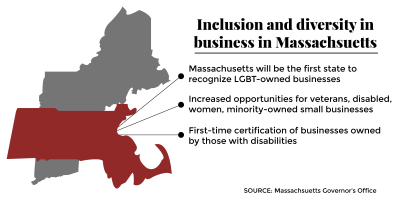
Massachusetts will become the first state in the nation to recognize businesses owned by LGBT individuals and those with disabilities, Massachusetts Gov. Charlie Baker announced Tuesday.
Improvements for the Commonwealth’s supplier program include expanded benchmarks for businesses owned by women, minorities, veterans, LGBT individuals and individuals with disabilities.
“We are committed to ensuring diversity as the state engages business suppliers and contractors and are excited about this opportunity to include LGBT, disability and veteran business owners in the state’s network and procurement chain,” Baker said in a Tuesday press release.
Jabes Rojas, deputy chief for access and opportunity, said Baker’s efforts to certify diverse small businesses are momentous.
“At the heart of these efforts is the goal to grow the number of diverse and small companies participating and conducting business with the state as well as increasing the total dollar amount annually won by diverse and small businesses from across the Commonwealth,” Rojas said in the release.
The administration is focused on providing diversity within the state’s procurement chain, Baker said.
“The Lieutenant Governor and I are proud to uphold our promise to expand opportunities for diverse and small businesses as our administration works to extend economic prosperity to more communities throughout the Commonwealth,” Baker said.
Justin Nelson, co-founder and president of the National Gay and Lesbian Chamber of Commerce, said the Baker administration has recognized what over one third of the Fortune 500 has already.
“LGBT-inclusive supplier diversity means that there will be greater LGBT business visibility across Massachusetts,” Nelson said in a Tuesday release . “We now call upon leaders in states with large LGBT business populations, like New York, Illinois, and others to follow the precedent set by Massachusetts to create equal business opportunities for LGBT citizens nationwide.”
More than 21,000 LGBT-owned businesses will be affected by Baker’s decision, according to the release.
Edmund Clark, a professor of entrepreneurship and innovation at Northeastern University, said this change could be an advancement for LGBT business owners.
“I would assume there is some impact on them as well,” he said. “Because I focus on small business I am not really following what that community is doing, but it certainly seems like it is an advancement on their part.”
Several residents said they are happy to see this kind of movement taking place.
Dale Ziobro, 22, of Brighton, said other states should follow Massachusetts’ efforts to be more inclusive.
“That’s something that a lot of other states need to embrace as well,” she said. “It’s great that Massachusetts is leading at that and I hope others follow soon.”
Vishal Chandaria, 23, of Fenway, said he admires the city’s efforts to raise awareness about the LGBT community.
“It’s OK and it’s a pretty good thing that they would be the first to start something like that because I think that they [the community] need a little bit more representation or if not, at least a bit more awareness from others,” he said.
Andreh Braekeh, 41, of Brighton, said it is important for businesses to not discriminate against their employees or customers.
“Owning a business is a very courageous thing to do. If anybody can do it, then it doesn’t matter what their sexual orientation is or what their gender is,” she said. “It’s a great thing. I’m trying to have my own business and it’s really very hard so if someone can do it, then they should have all the support they can get, no matter their sexual orientation.”
Olivia Quintana contributed to the reporting of this article.



















































































































